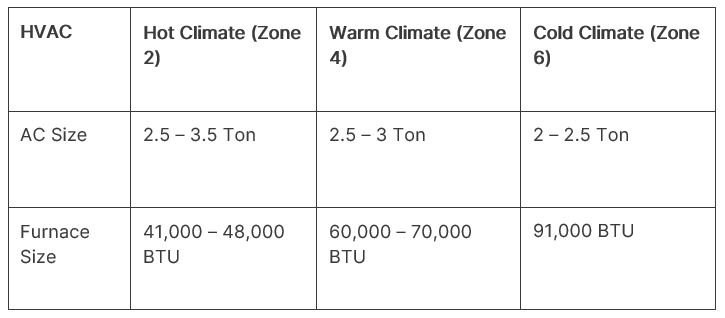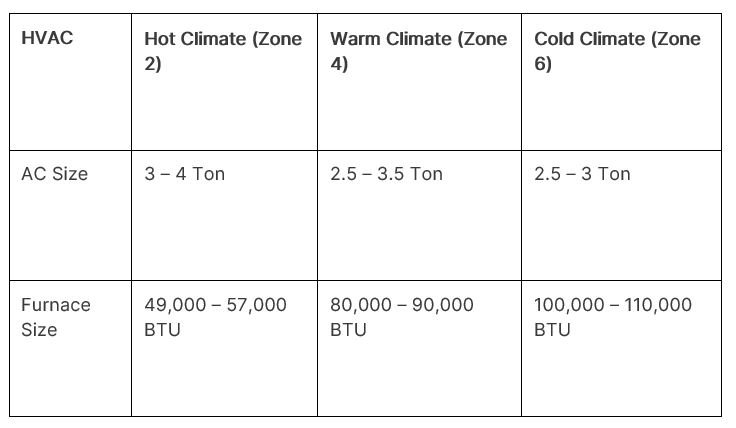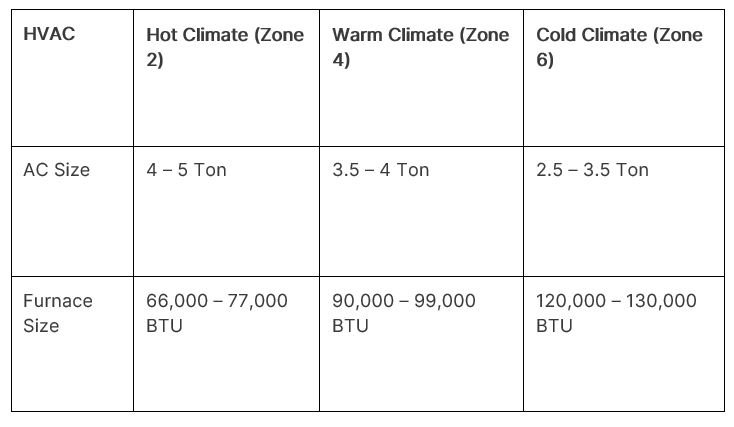What Size HVAC Unit Do I Need? We Asked the Pros
Your heating and air system keeps your family comfortable all year long. So when it’s time to replace it, you’ll want to be sure to maintain that comfort in the most energy-efficient way possible.
But when it comes to something as important as your home’s heating and cooling, you also don’t want to skimp and end up with a unit that’s too small or too large. So, what size HVAC do you need for your home?
In this article, we’ll walk you through everything you need about HVAC sizing so that you can choose the right unit for your home.
What Size HVAC Unit Do We Need?
Every home is different, so you really need to evaluate your home to determine the best type of system for your particular needs. You must look for HVAC brands with the best results, the longest life, and energy efficiency.
The first question to ask yourself is what type of heating and cooling do you prefer? Electric heat is more efficient for the milder temperatures we see around the South, but some people prefer gas heat for those times when it gets really, really cold.
But when considering the size of HVAC unit, bigger isn't always better. If your system is too big, it will heat and cool your home too quickly, and then shut off. This type of frequent on/off cycling doesn’t dehumidify your home properly and can cause uneven temperatures and higher energy bills. That’s why it’s important to get the right size of HVAC unit.

To find out what size HVAC unit is best for your home, it's important to first identify what type of cooling or heating system you currently have in place. HVAC systems use either electric, natural gas or propane for heating, so you’ll need to determine which fuel you have available in your home. Then you can decide whether to consider the options of an all-electric or a gas-hybrid system.
Typically, homeowners go back to the same type of unit that’s being replaced. It’s a lot easier since the home is already set up for that type of system. But if you’re considering other types of HVAC systems, there are some general guides that you must follow.
- For homes with forced air heat, a 5-ton unit will be sufficient.
- Homes with gas heat will require a heat pump.
- Most homes with electric heat will require a 3-ton unit.
- If your home does not have forced air for your heating needs, what size unit is needed will be determined by the highest BTU (British Thermal Unit) heating load for your home.
- If you do not have any cooling system in place, the size AC unit you should install will depend upon what type of rooms need to be cooled.
How to Calculate the Right Size HVAC Unit?
Once you’ve chosen the type of the HVAC unit, you’ll need to determine the size of the system to install. You’ll need to consider the following things to calculate the right size.
1. Climate Zone
The most important thing is understanding the climate before calculating the HVAC size. The United States is divided up into climate zones that can help you understand the weather and temperatures in the area of the country in which you live.
Take a look at this map to see what zone your home is located. If you are close to two zones, select the cooler zone, so you do not buy HVAC with small furnaces.

2. Insulation Condition
You don’t want warm air escaping in the winter and hot air trying to get in during the summer. Insulation is what keeps heated and cooled air inside your home. Here in the South, you want to make sure your attic insulation has a minimum value of R-38. An R-38 level slows down the transfer of heat, so it doesn’t escape through your roof. If you don’t know what level you have, just take a look in your attic. If the insulation is pink or white and fluffy, and it’s about a foot deep, then you likely have enough insulation.
If your home was built between 1990 and 2010 and has not been updated to make it “energy efficient,” you may need to add more insulation. And if you live in an older home that hasn’t been completely renovated, then you likely have very poor insulation levels. You’ll want to consider getting insulation levels up to the standard “R rating” for your area at the same time you’re replacing your HVAC unit.
3. Home Size
You’ll need to determine how many BTU’s it takes to heat and cool your home. A BTU is a standard measurement of what’s required to heat or cool one pound of water by one degree Fahrenheit. Obviously, the bigger the home, the more BTUs are needed to maintain comfort. For example, a 2,100-square-foot home would need around 42,000 BTUs to remain comfortable year-round. But you’d actually want a HVAC unit that can produce a bit more than that for maximum comfort and energy efficiency. Why’s that?
Because you’ll want a unit that produces enough BTUs for not only normal weather conditions, but also extreme hot and cold weather situations, when those arise. A good rule of thumb is that you’ll want a unit that can produce 40% more BTUs for heating and 15% more for cooling than is actually needed for your home. Having that bit of extra power is a good thing—especially during the sweltering summers and bitter winters we sometimes get around here. Consider this chart that outlines the BTUs needed for various home sizes:
Home Size = BTUs Needed
1,200 sq ft = 24,000 BTUs
1,500 sq ft = 30,000 BTUs
2,100 sq ft = 42,000 BTUs
2,400 sq ft = 48,000 BTUs
3,000 sq ft = 60,000 BTUs
So, for every 12,000 BTUs, you’ll need one ton of unit size. So, if you need 36,000 BTUs, you’ll want a 3-ton unit. Not too big, not too small.
4. Sun Exposure
How much sun does your roof get? Does it get full sun, partial sun or no sun at all? This can impact your HVAC requirements. Make note of the sun exposure your roof gets during certain times of day to get an idea of your sun exposure.
If you don’t have many trees shading your roof, then you have the benefit of the sun helping heat your home during the day. This can assist your HVAC system in the colder months so it doesn’t have to run as often.
Conversely, if you do have a large canopy of trees shading your roof in the spring and summer, then your home will naturally stay cooler. That can impact the frequency of your air conditioning coming on, and help keep your HVAC from having to work so hard during warm weather.

5. Different Types of HVAC Systems
You’ll need to consider the type of HVAC system to be replaced. Most homeowners replace their HVAC units with the same type that is currently in use. However, you may want to consider another type of system if you’re building or remodeling a home. Or, depending on the size and type of your home, you may want to replace your HVAC system with a type of system that is better suited for your needs.
There are four common types of HVAC systems. A Split system, a Hybrid Heat Pump, Package Heating and Air, and a Mini Split System.
Split Systems have two units. The cooling unit, located outside the home, contains a compressor, condenser coils and fan. The heating unit, which contains the air handler, is located indoors—in an attic, basement or crawl space. Both units utilize the same thermostat and work together to keep your home comfortable. If your home includes ample space for the two units, then a split system may be right for you.
A Dual Fuel, or Hybrid Heat Pump system works a lot like a traditional split system. The big difference here is that it contains both an electric heat pump and a natural gas or propane furnace. An electric heat pump is typically fine for the milder temperatures we see around here. But if the weather outside gets so cold that you’re losing more BTUs than the electric compressor can supply—the system automatically switches to its other type of heating fuel, which is natural gas or propane.
A third type of HVAC system is called Packaged Heating and Air. With this option, instead of having an indoor unit and an outdoor unit, all of the components are contained in one single heating and air unit located outside. Packaged Heating and Air systems heat and cool the same as a split unit system. So a 2-ton split unit and a 2-ton packaged unit will produce the same heating and cooling capacity.
Finally, a Mini-Split system has individual heating and air units for each individual space. Mini Split units enable you to completely control the temperature in a particular room, so you can maintain different comfort levels in different areas. You can even save energy by turning off individual units when a space is not in use.
Mini Split’s have a wall or ceiling unit mounted indoors that’s linked to a compressor located outside. Some even fit flush against the wall or ceiling, so they’re not as noticeable.
You can choose between a ductless system, or a ducted system which utilizes your existing ductwork. They’re great for new additions, like master suites, outdoor sheds or garage apartments. Obviously they’re great for tiny homes. And they’re also the perfect, energy-efficient option for spaces that currently rely on window-unit air conditioners and baseboard heaters.

6. Manual J Calculation
Make sure your contractor performs what’s called a “Manual J Load Calculation” to determine the right size unit for your home. This calculation takes into consideration many things like the number of doors and windows, insulation, number of people living in the home and other factors to determine the right size of unit needed for your particular home. It’s really important that they do this calculation. In fact,
it’s now required for new construction.
Here’s how a contractor determines the size of HVAC unit using the Manual J Load Calculation:
Manual J Load Calculation:
(square footage) X (ceiling height) = A
(# occupants) X 100 BTU = B
(# exterior doors) X 1,000 BTU = C
(# windows) X 1,000 BTU = D
_______________________
A + B + C + D = # of BTU’s your home needs
7. Square Foot Calculation
HVAC units are sized in tonnage, 1 ton up to 6 tons, based on their BTU capacity. The right size for your home is based on its square footage. For example, a 1,500-square-foot home would need a 2.5 ton unit in order to produce the amount of BTUs needed to efficiently heat and cool it all year long. And, you may want to step it up to a 3 ton unit to get those added BTUs we discussed above.
This chart outlines a rough idea of the size unit you might need based solely on square footage:
Home Size = Right HVAC Size
1,200 sq ft = 2 tons
1,500 sq ft = 2.5 tons
2,100 sq ft = 3.5 tons
2,400 sq ft = 4-4.5 tons
3,000 sq ft = 5 tons
You can also check out this handy calculator to see for yourself. And, ask your HVAC dealer for the best solution for your home. However, it’s recommended that you still have your contractor do a Manual J Load Calculation to get the exact size unit specific to your home.
Buying an HVAC System Too Big or Too Small for Your Home
To maximize your home’s energy efficiency, it’s essential to get the right-sized unit for your home. If your system is too small, then it will run longer and more frequently, which drives up energy costs. Plus, it will always have a difficult time maintaining the temperature you set on your thermostat.
If your system is too big, it will heat and cool your home too quickly, and then shut off. This type of frequent on/off cycling doesn’t dehumidify your home properly and can cause uneven temperatures and higher energy bills. That’s why it’s important to get the right size of HVAC unit.

What Size HVAC System Should You Get?
Here’s the size HVAC unit you need for a 1,500 square foot home with average insulation condition:

For an 1,800 square foot home with average insulation condition:

For a 2,200 square foot home that has average insulation condition:

Choosing the Right HVAC Size For You
The fact is, there aren’t fixed HVAC size recommendations because it depends on your home, the climate in which it’s located and your family’s needs. However, consider the points mentioned above and then calculate what is the right size for you.
If you can’t calculate it yourself, consult your HVAC contractor or hire an HVAC recommendation expert. For EPB customers, the EPB Energy ProsSM are here to help you decide the best options for your situation. We’ll evaluate your needs, review estimates, let you know if there are rebates or incentives available and make sure you’re getting the best solution. If you live in the Chattanooga area and have EPB, call the EPB Energy Pros at 423-648-1372 or schedule your free consultation.



